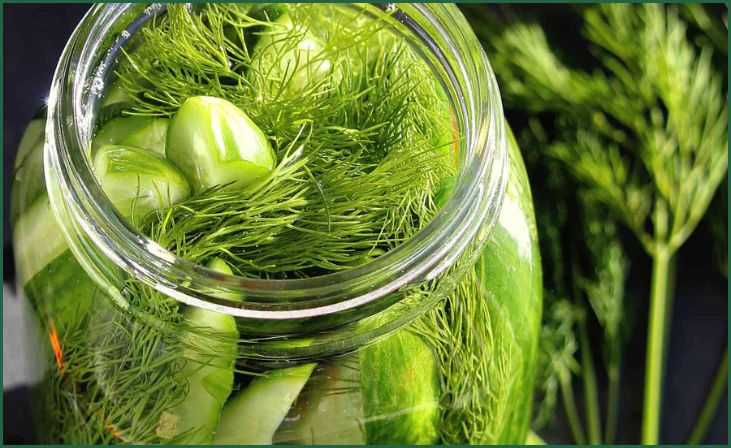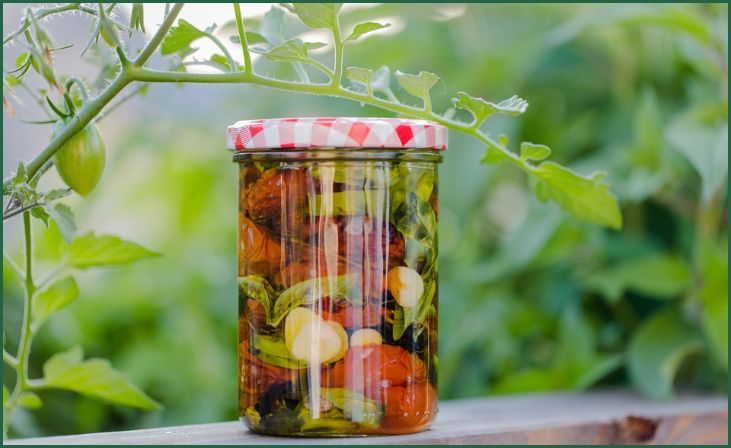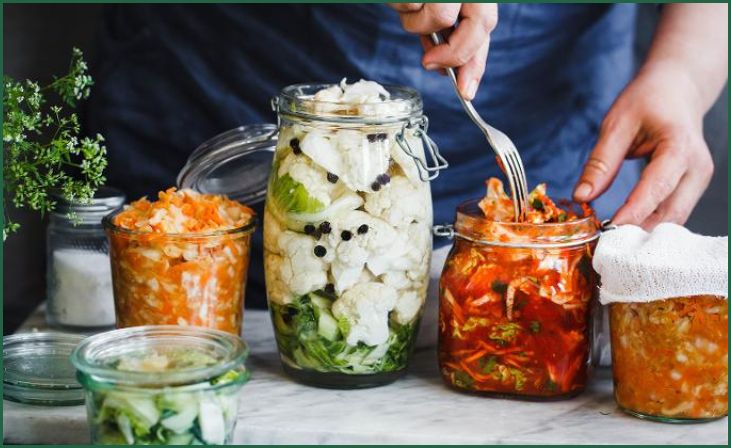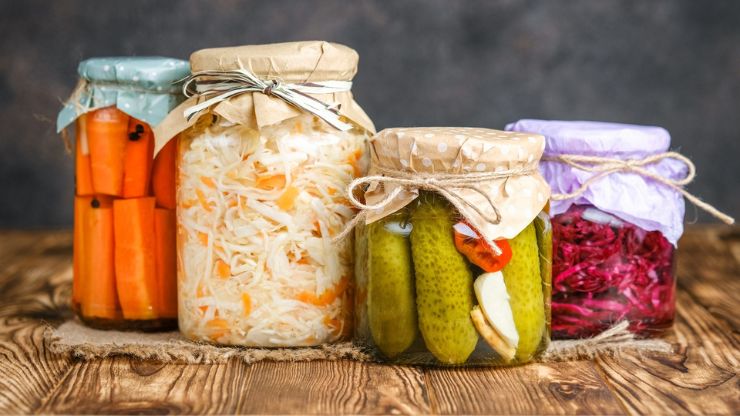Pickling Versus Fermenting – Preserving food is a practice that has stood the test of time, evolving and adapting to the changing needs and tastes of humanity. Two of the most popular and enduring methods for food preservation are pickling and fermenting. These techniques have distinct characteristics, flavors, and benefits that have made them favorites among food enthusiasts and preservationists alike.
In this article, we embark on a journey into the realms of pickling and fermenting, two culinary traditions that have not only preserved food but also transformed it into delightful, flavorful creations. We’ll delve into the heart of these age-old techniques, exploring their unique differences, the intricacies of their processes, and the mouthwatering results they yield. So, let’s embark on this culinary adventure and discover the world of pickling versus fermenting.
Table of Contents
TogglePickling Versus Fermenting: A Brief Overview

Let’s dive into the intriguing world of “Pickling Versus Fermenting.” These two food preservation techniques offer distinct processes and create unique end products.
Pickling Versus Fermenting Defined
At their core, pickling and fermenting are both age-old methods used to preserve food. However, the way they achieve this goal is where they truly stand apart.
Also Read:- Purple Powerhouse Ferments
Pickling: A Tangy Transformation
Pickling is a culinary process that involves submerging food in an acidic solution, often using vinegar as the primary ingredient. This immersion results in a delightful transformation, giving the food a tangy and zesty flavor profile. The art of pickling is renowned for its remarkable ability to extend the shelf life of various foods, allowing you to savor their flavors for extended periods.
Fermenting: The Art of Natural Transformation
On the other hand, fermenting takes a more natural approach to preservation. It relies on the fascinating process of beneficial bacteria breaking down the sugars present in the food. This natural alchemy results in a distinct sour and complex flavor that is a hallmark of fermented delights. Beyond the unique taste, fermenting is also celebrated for its health benefits, as it introduces probiotics that promote a healthy gut.
The Pickling Process

Let’s unravel the intricacies of the Pickling Process, a culinary art that has preserved and enhanced the flavors of many delectable ingredients.
Ingredients for Pickling
Embarking on the pickling journey requires a handful of key ingredients. Start by gathering fresh vegetables or fruits that you intend to pickle. Additionally, you’ll need vinegar, the primary preserving agent, and an array of spices and herbs to infuse your pickles with delightful flavors. Common choices include dill, garlic, and mustard seeds, but don’t hesitate to get creative and experiment with your favorite seasonings.
Step by Step Pickling
The pickling process involves a series of carefully crafted steps to ensure that your preserved delicacies turn out perfectly:
Wash and Prepare the Produce: Thoroughly wash and prepare the vegetables or fruits. This step ensures that your pickles are clean and ready for the preserving process.
Create a Pickling Solution: In a pot, combine vinegar, water, and sugar to create a pickling solution. This solution serves as the preserving liquid that imparts the characteristic tangy flavor to your pickles.
Add Spices and Herbs for Flavor: To infuse your pickles with aromatic and flavorful notes, add your chosen spices and herbs to the pickling solution. This is where your creativity can shine, as you experiment with various seasonings to achieve the taste you desire.
Submerge the Food in the Solution: Gently place the prepared vegetables or fruits into the pickling solution. Ensure that they are fully submerged, allowing the preserving magic to work its wonders.
Seal the Container and Store It: Once your pickles are nestled in the pickling solution, seal the container tightly. To complete the process, store it in a cool, dark place, allowing the flavors to meld and develop over time.
Don't just scroll, subscribe!
BuzzTrail's unique web-stories are the cure for boredom you've been waiting for.
Pickling Benefits
The art of pickling extends far beyond preservation; it also elevates the taste and texture of your favorite foods. Here’s why pickling is a beloved culinary tradition:
Extended Shelf Life: Pickling is renowned for its ability to prolong the shelf life of foods, ensuring that you can enjoy your favorite veggies year-round. This preservation method allows you to savor seasonal produce even when it’s out of season.
Enhanced Taste and Texture: As the pickling solution works its magic, it not only preserves but also enhances the taste and texture of the ingredients. The tangy and zesty flavors that develop during the pickling process add a delightful dimension to the preserved food.
The Fermenting Process

Now, let’s embark on a journey into the fascinating Fermenting Process, an age-old technique that adds a unique twist to food preservation and flavor development.
Ingredients for Fermenting
Fermenting relies on a simple yet crucial set of ingredients. The primary component is salt, a vital element that initiates the transformative process. Depending on the specific recipe, you might also require starter cultures, which kickstart the fermentation process and give it a distinctive character.
Step by Step Fermenting
The art of fermenting follows a set of precise steps to achieve the perfect balance of flavor and preservation:
Prepare the Vegetables and Create a Brine Solution: Begin by thoroughly preparing the vegetables you wish to ferment. Once they are ready, create a brine solution using salt and water. The salt concentration in the brine is critical, as it helps control the fermentation process and prevents unwanted bacterial growth.
Submerge the Vegetables in the Brine: Gently place the prepared vegetables into the brine solution, ensuring that they are fully submerged. This submersion in the salty brine initiates the fermentation process, setting the stage for the development of complex flavors.
Seal the Container, Allowing Air to Escape: To create the ideal environment for fermentation, seal the container, but with a crucial twist. While sealing it, allow a means for air to escape, preventing pressure buildup. This controlled release of gases is essential for a successful ferment.
Let It Ferment at Room Temperature: Place the sealed container in a location with a stable room temperature. The fermentation process takes time, allowing the beneficial bacteria to work their magic, transforming the flavors and textures of the ingredients.
Fermenting Benefits
Fermenting offers a unique set of advantages that go beyond preservation and flavor enhancement:
Promotes the Growth of Probiotics: One of the standout benefits of fermented foods is their ability to promote the growth of probiotics. These beneficial bacteria are excellent for gut health, supporting digestion and overall well-being.
Imparts Unique Flavors and Textures: The fermentation process imparts distinct sour and complex flavors to the food. It also alters the texture, creating a characteristic crunch or tenderness that is highly sought after in fermented delicacies.
Also Read:- Health Benefits of Colorful Ferments
Conclusion
In the world of food preservation, pickling and fermenting stand as two distinct and flavorful methods. While pickling offers a tangy and zesty taste that can last for years, fermenting introduces a complex sourness and gut-friendly probiotics to your diet. The choice between these methods depends on your flavor preferences and dietary needs. So, whether you’re craving a crisp, pickled cucumber or a tangy sauerkraut, you now have the knowledge to make the right pickling versus fermenting decision for your culinary adventures.
Frequently Asked Questions
What is the main difference between pickling and fermenting?
What is the main difference between pickling and fermenting?
The main difference lies in the preservation method. Pickling uses an acidic solution, while fermenting relies on natural bacteria to preserve the food.
Can you pickle and ferment the same foods?
Can you pickle and ferment the same foods?
Yes, you can pickle and ferment some foods, but the results will have different flavors and textures.

